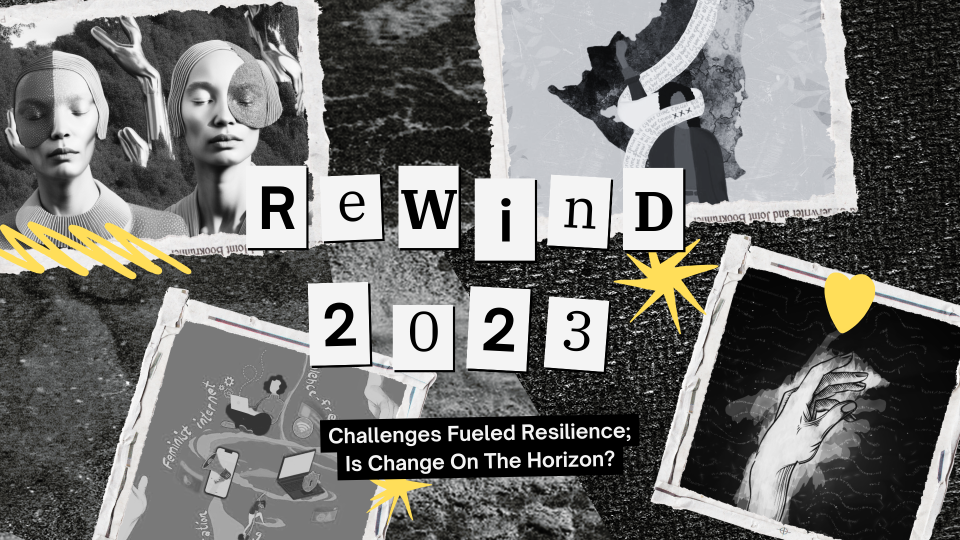
“Hello,
How are you?
Sending you love and strength during these stressful times, and hope that you and your loved ones are safe.”
This is how I’ve started a lot of my emails this past year. These emails were written with an aching heart and the awareness that somewhere around us, someone is experiencing some form of violence and is fighting to live, and that this violence affects all of us; all of our hearts are aching.
The year 2023 serves as a reminder of many challenges and opportunities that we collectively and individually faced in the past year. It was not easy, with three active genocides, surveillance capitalism and tech monopoly fuelling authoritarian violence, continued gender based violence online and offline, consistently increasing abuse of various kinds, draconian laws criminalising identities of individuals and groups around the world, increased scrutiny of bodies – particularly gendered bodies, attacks on fundamental human rights, countless international meetings and events among those who hold power to discuss the future of the world while the present looks equally uncertain – 2023 was a reminder that we need to hold on to hope for peace around the world a little tighter, and we will have to fight back against violence in all its forms for a little longer.
This past year was also a reminder that this hope, resilience and resistance are all the more important and critically needed to fight for, demand and exercise human rights around the world. This resistance took many forms: protests on the streets and online, advocacy in the halls of power, researched evidence of violence contributing to dialogue and demands, consistent and strategic writing to communicate feelings of fear, anger, sadness, happiness and everything else in between. It was a collective effort of human rights defenders, activists and everyone else standing up for these rights who organised and mobilised in ways that are effective and work for them and for those around them.
Being an editor of GenderIT – a feminist publication that focuses on stories of gender, sexuality and technology in the global south, I have had the privilege of engaging with and witnessing our global community of writers, researchers, activists, rights defenders, academics and artists consistently pushing back in uncertain political climates that they navigate, through various ways they contributed to the publication. Their nuanced take on political, social and cultural issues not only informed our campaigning and advocacy at APC, but it also enabled GenderIT and the larger APC community in offering critical feminist perspectives to our audience and members.
2023 was a reminder that we need to hold on to hope for peace around the world a little tighter, and we will have to fight back against violence in all its forms for a little longer.
2023 also reminds us that there’s still hope as long as there are people pushing back against authoritarian and draconian violence, fighting for justice, and demanding and standing up for human rights for all.
It has been a challenging yet wonderful year. We spoke about digital rights from a uniquely gendered lens, with an understanding that we have the responsibility to highlight issues pertaining to this critical aspect of technology that mainstream and digital media routinely misses. This understanding is built upon decades of research, campaigning and advocacy work on gender, sexuality and technology that APC has done around the world with its partners and members. This very experience along with the trust of GenderIT’s writers with their voices have put the publication at the centre of global conversations on gender and technology.
Here, we look back at some of the must-read stories that serve as a reminder of our collective resistance against violence around the world;
-
Meta is Silencing Genocide
Meta has actively silenced the voices of Palestinians on its platforms, and has done so without any accountability. It has repeatedly shadow banned and suspended accounts of those expressing support for Palestine and/or calling out Israel for murdering innocent civilians in attempts to expand its settler colonialism on the Palestinian lands. The constant shadowbanning of voices of support for Palestine on Instgram and Facebook during an active genocide of Palestinians by Israel is yet another reminder that Meta has blood on its hands and it must be questioned about the role it plays in advancing ethnic cleansing and genocide in Palestine by Israel. Hija Kamran writes here.
-
Of The Things War Did To Us
The Ethiopian government has been at war with its regional state, Tigray, for at least 2 years as a result of a years long conflict between the two. The war was officially declared in 2020 and lasted for 2 years, which led to the death of over 160,000 people in the region. Much like all wars, this war also disproportionately affected innocent civilians who had to bear the brunt of the violence they wanted no part in. Author Etenat Awol writes about her experience of a war ravaging all she knew – or thought she knew – of land, love and liberation. Her articulation of the sentences exacted upon her (and many daughters of the Horn like her) through the war of identity politics and beyond is a thread you might find yourself holding and weaving yourself into the fragile but resilient social fabric of this human experience. Read the article here.
-
LGBTQIA+ rights are not a political plaything
Uganda passed the draconian Anti-Homosexuality Act in May 2023, that led to the criminalisation of queer folks’ identities and personhood in the country. For years, governments and societies have weaponised legal tools and mechanisms to victimise gender and sexual minorities around the world, and the recent Ugandan law targeting LGBTQIA+ people is a new edition to this series of authoritarian attacks of the government against its citizens. Authors Dr. Nyx McLean and Thurlo Cicero express concerns in this article and how the law will continue to impact LGBTQIA+ folks on a personal, professional, psychological and social levels. Read the article here.
-
Creating A Space For Queer Expression On Pakistani Internet
The rights and safety of LGBTQIA+ people have historically been under threat throughout the world, leading to a trend of self-censorship that queer people are forced to employ in order to remain safe. This means that even when they have a space to express themselves, they struggle out of fear of repercussions that are routinely violent. The author in this article talks about their personal struggles of trying to break the silence and how that gives strength to others around them to own their identity and share it with the world. In a way, they are creating a safe digital space of queer expression in Pakistan. Read the article here.
-
Examining The Digital Exclusion Of Women And Online Gender-Based Violence In Sudan
Sudan has been experiencing political instability since years, leading to it unfairly impacting people's everyday lives, including women’s. To top this violence off, the sanctions by the US against the country means that Sudan cannot access important services and tools from around the world, the effect of which is multifold, including on education, access to digital devices and services, as well as increased online gender based violence. In this article which is the summary of the research conducted by two Sudanese authors under APC’s Feminist Internet Research Network (FIRN), the writers highlight the major issues these sanctions pose to the women and young girls in the country because of these sanctions. Read the article here.
-
Protecting Civil Rights Against Corporate Surveillance In South Korea
Surveillance capitalism has consistently impacted people’s rights in the digital realm, to the point that it has led to real life violence ranging from gender, religious and caste based attacks to genocides like in Myanmar, and Big Tech has consistently avoided accountability or transparency. In South Korea, six activists challenged Google’s lack of transparency when the company refused to share the personal information it held on these activists. The court case led by the digital rights organisation, Jinbonet, got the strong decision in favour of the activists, with the Supreme Court ruling that Google must provide them access to their data as required under the Korean laws. Read the full story here.
-
Policy Recommendations From FIRN Research
The Feminist Internet Research Network (FIRN) published 4 in-depth feminist research studies that examined and analysed the impact of technology-facilitated gender based violence (TFGBV) on vulnerable groups in the Global South. The studies were conducted in Turkey, Sudan, Democratic Republic of Congo, and Botswana, Rwanda, South Africa and Uganda, and employed various forms of research methods to explore how TFGBV impacted women and gender and sexual minorities in these countries. These studies propose evidence based findings in order to suggest “substantial and nuanced Global South entry point to building recommendations for various stakeholders and building better systems to respond to experiences of violence but also enhance accountability between technology companies, governments, and citizens.” Read the common recommendations in all four of these studies here.
-
Digitisation Under India’s Rural Employment Act Troubles Rural Women Workers
Governments around the world have increasingly been digitising official processes in attempts to make it efficient for citizens around their countries. However, this e-governance comes at the cost of ignoring structural and societal inequalities that bar people from benefiting from these services. In India, the government passed an amendment in the rural employment act that digitised the attendance process of workers that resulted in exacerbating the longstanding issues for women workers owing to the lack of digital literacy and access among them. Sweta Das writes here.
-
Feminists In The Panopticon: How Surveillance Capitalism Captures Feminist Movements
Feminists around the world have used digital tools and social media platforms to mobilise movements. They have done so by being strategic about what they post, how they post it and for whom they are posting. These platforms have helped them organise for a shared cause, but the question remains – at what cost? In this article, Nadz Moawad argues that Big Tech has benefitted from feminists and their content for radical movement mobilisation, by treating them as mere data points. The article also highlights how the accounts are punished with shadowbanning and suspension if we do not continue to feed content that generates profits for the corporations. Read the story here.
-
Digital Waves Of Hate: The Struggle Continues For Pakistan’s Transgender Community
Transgender community in Pakistan has always been under attacks of various kinds throughout the country’s history of 78 years. Transgender folks have constantly stood for and demanded safety and basic human rights protected under the country’s constitutions. These movements to demand rights led to some successes including a progressive law, Transgender Persons (Protection of Rights) Act, that’s anti-discriminatory and gave the community the right to self-identify coupled with the ability to have their identity and gender changed in the national ID card. But recent social media campaigns targeting the community with disinformation that weaponised religion and cultural biases against trans folks put the law under threat, and with it the rights of the community already living on the margins. Read the article by Zainab Durrani here.
**
As we conclude the year 2023, we acknowledge that the road to gender justice and protection of all human rights is tiresome and a long one. But it is the resistance and resilience of each one of us against the stifling of human rights around the world that will contribute to a radical and long lasting change. This hope has sustained us thus far, and the same hope will continue to unite us in the years to come.
- 88 views







Add new comment